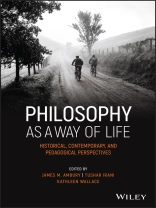In the ancient world, philosophy was understood to be a practical guide for living, or even itself a way of life. This volume of essays brings historical views about philosophy as a way of life, coupled with their modern equivalents, more prevalently into the domain of the contemporary scholarly world.
* Illustrates how the articulation of philosophy as a way of life and its pedagogical implementation advances the love of wisdom
* Questions how we might convey the love of wisdom as not only a body of dogmatic principles and axiomatic truths but also a lived exercise that can be practiced
* Offers a collection of essays on an emerging field of philosophical research
* Essential reading for academics, researchers and scholars of philosophy, moral philosophy, and pedagogy; also business and professional people who have an interest in expanding their horizons
Tabla de materias
Notes on Contributors ix
Introduction 1
James M. Ambury, Tushar Irani, and Kathleen Wallace
Part 1: History of Philosophy 5
1 Ancient Greek Philosophia in India as a Way of Life 7
Christopher Moore
2 Philosophy and the Good Life in the Zhuangzi 25
Pengbo Liu
3 Esoteric Confucianism, Moral Dilemmas, and Filial Piety 45
William Sin
4 Renaissance Humanism and Philosophy as a Way of Life 65
John Sellars
5 Cartesian Philosophy as Spiritual Practice 83
Joseph I. Breidenstein Jr.
6 Leibniz’s Philosophy as a Way of Life? 97
Paul Lodge
7 Philosophy as a Feminist Spirituality and Critical Practice for Mary Astell 117
Simone Webb
8 Nietzsche and Unamuno on Conatus and the Agapeic Way of Life 141
Alberto Oya
9 Ways of Discourse and Ways of Life: Plato on the Conflict Between Poetry and Philosophy 155
I-Kai Jeng
10 Stoicism and its Telos: Insights from Michel Foucault 173
Robin Weiss
Part 2: Moral Philosophy 193
11 Philosophy as a Way of Life Today: History, Criticism, and Apology 195
Marta Faustino
12 Setting Limits to Practical Reflection: Against Philosophy as a Way of Life 213
Vitor Sommavilla
13 What It Takes to Live Philosophically: Or, How to Progress in the Art of Living 229
Caleb M. Cohoe and Stephen R. Grimm
14 Why Practice Philosophy as a Way of Life? 249
Javier Hidalgo
Part 3: Pedagogy 271
15 On the Benefits of Philosophy as a Way of Life in a General Introductory Course 273
Jake Wright
16 Philosophy as Empirical Exploration of Living: An Approach to Courses in Philosophy as a Way of Life 293
Steven Horst
Index 309
Sobre el autor
JAMES M. AMBURY is an associate professor of philosophy at King’s College in Wilkes-Barre, Pennsylvania, and is a member of the Mellon Philosophy as a Way of Life Network. He is the co-editor (with Andy German) of Knowledge and Ignorance of Self in Platonic Philosophy (2019) and has published articles in Ancient Philosophy, International Philosophical Quarterly, Proceedings of the Boston Area Colloquium in Ancient Philosophy, Dionysius, and Plato.
TUSHAR IRANI is an associate professor of philosophy and letters at Wesleyan University, Connecticut. Apart from his interests in philosophy as a way of life, he works on issues of philosophical method, the history and practice of rhetoric, virtue ethics, and moral psychology in ancient Greek and Roman philosophy. He is the author most recently of Plato on the Value of Philosophy: The Art of Argument in the Gorgias and Phaedrus (2017).
KATHLEEN WALLACE is professor of philosophy at Hofstra University. She is the author of The Network Self: Relation, Process, and Personal Identity (2019). In addition to her interest in philosophy as a way of life, her work spans interests in personal identity and anonymity, ethics, metaphysics, and American philosophy. She is currently on the Board of the Society for the Advancement of American Philosophy and is also the book review editor for Metaphilosophy.












